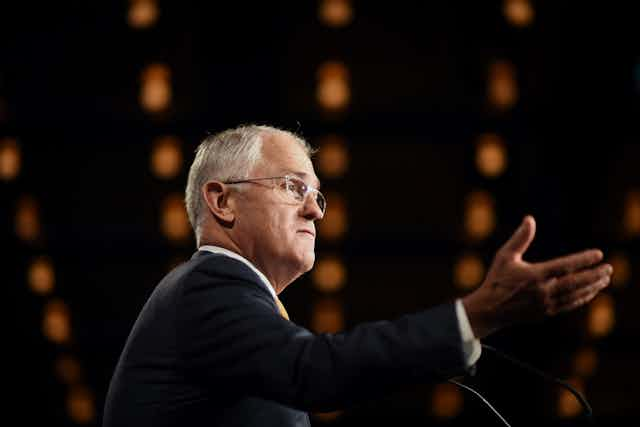Malcolm Turnbull’s speech to deflated supporters in the early hours of Sunday morning was extraordinarily lacking in self-awareness.
Turnbull had just brought his party a devastatingly bad election result. That’s true even if he manages to reach majority government, which remains far from clear despite his assertions. In the early hours of Sunday things got closer as more votes were counted. With 77.6% of the vote counted, the ABC tally had the Coalition and Labor on 67 seats each, five crossbenchers, and 11 seats in doubt.
Yet Turnbull showed not a scintilla of humility. He made no gesture of contrition, no promise that he had heard the message the people had delivered.
Instead he denounced Labor’s scare campaign – as if the Liberals themselves have not at times been masters of that dark art. And he made an unconvincing attempt to justify a double dissolution that has ended up producing a Senate as potentially difficult as the last one, with the added negative of including Pauline Hanson, so giving her a national platform.
There is now a bizarre parallel between Labor and the Liberals in turning triumph into disaster. Kevin Rudd won convincingly in 2007. He was then removed by his party and successor Julia Gillard came out of the subsequent election with a hung parliament. Tony Abbott had a strong win in 2013, was replaced – and now the Coalition will have a tiny majority or there will be another hung parliament, with the outcome depending on the crossbenchers.
Turnbull and his supporters can argue that if Abbott had still been leader the loss would have been greater, and that’s probably correct. But it is unlikely to be an argument that will do Turnbull much good in the days ahead when there won’t be a lot of Liberal love around.
Turnbull complains about Labor’s lies about Medicare’s future, but they were made more credible to the public because of the Coalition’s previous lies and actions. Did it think people would not remember Abbott’s 2013 promise of no cuts to health? Or the attempt in the 2014 budget to bring in a co-payment, unsuccessful though it was? Or the various subsequent moves for cuts and user pays measures?
Labor’s campaign might have been exaggerated and dishonest, but the Coalition itself had effectively given the ALP the building blocks for it.
Turnbull’s argument that he called a double dissolution not to change the nature of the Senate but because the lawlessness in the construction industry had to be confronted is facile. He did not even make the industrial relations legislation a central talking point in the campaign.
And in his speech he overlooked the point that even if he reaches majority government it is doubtful he would have the overall parliamentary numbers to get the bills through a joint sitting (although at this stage it is impossible to be definite about what the new senators might do).
In the wash-up, everything from the Coalition’s strategy for the past eight weeks – running almost entirely on a “plan” based on company tax cuts – to the mechanics of getting the case across, will be under internal criticism. It will be remembered that Turnbull’s pitch for leadership included his ability as an economic salesman. That, as it turned out, he over-hyped.
The Liberal conservatives will try to unravel policy. They started on election night with their bugbear – the superannuation changes. Assuming the Coalition survives in government, how will the ructions in the Liberals now play out for the same-sex marriage plebiscite?
Turnbull was looking for a mandate to allow him to be his own man. Instead of getting that, his government has been left struggling to survive.
If it does, the conservative forces will now take one of two views of him: as someone who must be forced to follow their will on core policies, or as someone who at a future date should be replaced. Or maybe they will adopt both views.
Turnbull’s enemies within his party have played this election craftily. Abbott was mostly quiet during the campaign, although in the final week he made clear that he thought the issues of budget repair, national security and border protection had been underdone. His former chief-of-staff Peta Credlin used her role as TV commentator to run an at times sharp critique of the Turnbull campaign. Now the conservatives will be full-throated.
Turnbull talks about the need for stability and unity. The Australian public is faced with instability. Whatever the result ends up being, there is no clear mandate and an extremely difficult Senate.
Turnbull, if he is still prime minister, would be confronted by the prospect of internal disunity plus a chaotic upper house that could likely make it nearly impossible to do much that is meaningful.
As happened when he was opposition leader, Turnbull is again in a situation where he didn’t read the danger signals. He thought he was more persuasive than Bill Shorten; he and his strategists (apparently) believed that whatever the national polls said, the marginal seats would stick. They said the election would be close but appeared confident it was in the bag.
Turnbull will pay a high price for his misjudgements, though it is unclear exactly how high.

